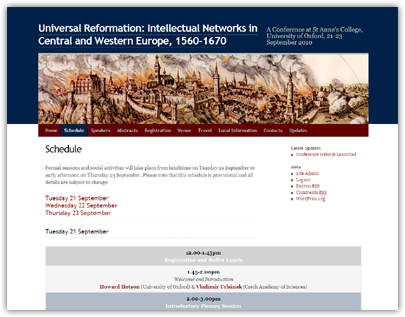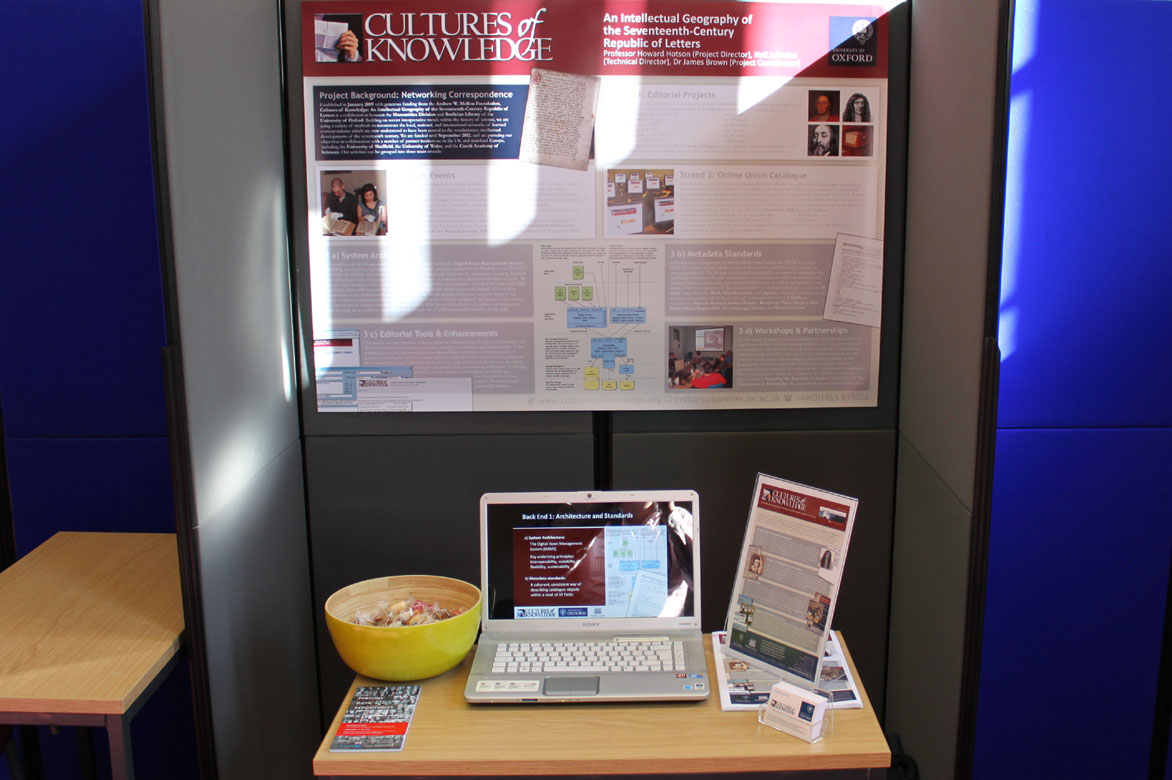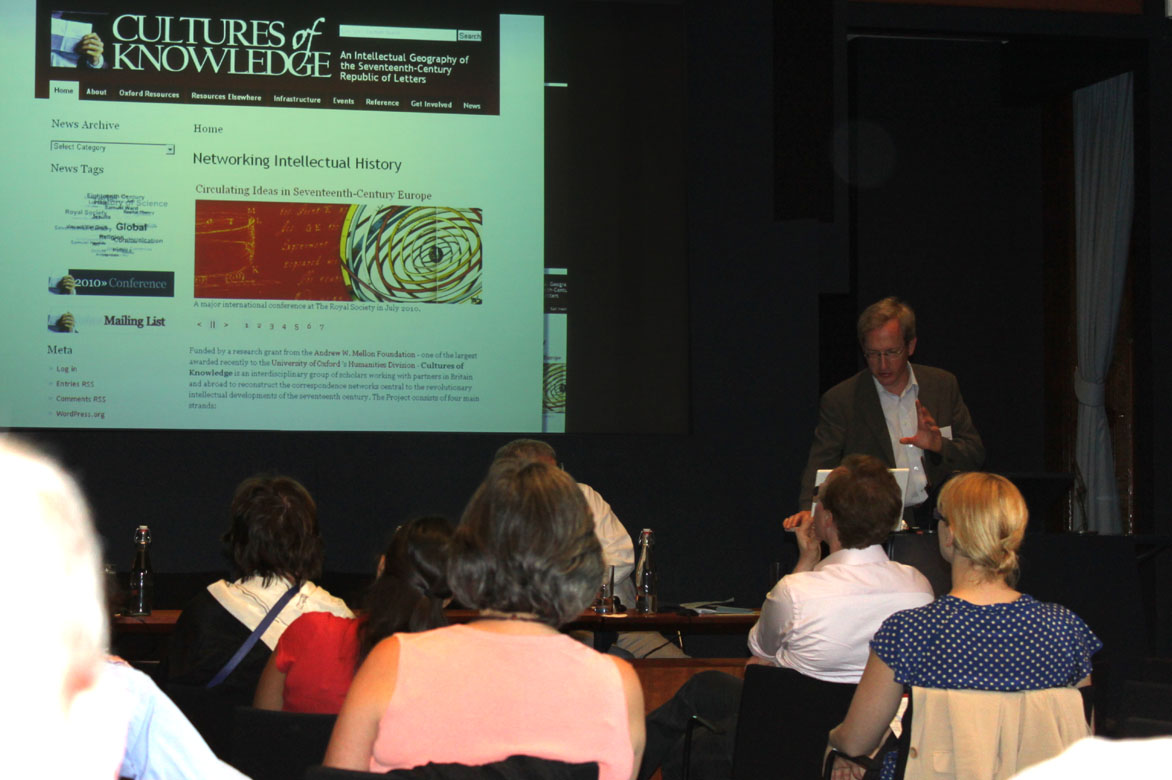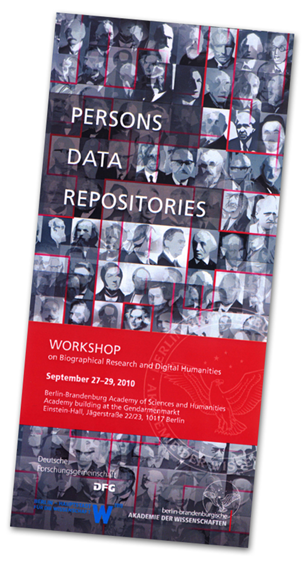James Brown
July 16, 2010
Conferences and Workshops, Events, Project Updates
Tags: Communication, Encyclopaedism, Europe, Jan Amos Comenius, Networks, Pansophia, Politics, Religion, Samuel Hartlib, Seventeenth Century
 We are pleased to announce that booking is now open for ‘Universal Reformation: Intellectual Networks in Central and Western Europe, 1560-1670’, the first Project conference, which will take place at St Anne’s College, Oxford, on 21-23 September 2010. Organised by Howard Hotson and Vladimír Urbánek, the event will showcase the work of a diverse group of emerging and established scholars, many from east central Europe, who will converge on the intellectual networks and traditions engendered by the upheavals of the Thirty Years War. For provisional programme information, a steadily growing lists of speaker profiles and abstracts, and to book online, please see the new conference website. The deadline for registration is Friday 10 September.
We are pleased to announce that booking is now open for ‘Universal Reformation: Intellectual Networks in Central and Western Europe, 1560-1670’, the first Project conference, which will take place at St Anne’s College, Oxford, on 21-23 September 2010. Organised by Howard Hotson and Vladimír Urbánek, the event will showcase the work of a diverse group of emerging and established scholars, many from east central Europe, who will converge on the intellectual networks and traditions engendered by the upheavals of the Thirty Years War. For provisional programme information, a steadily growing lists of speaker profiles and abstracts, and to book online, please see the new conference website. The deadline for registration is Friday 10 September.
James Brown
July 14, 2010
Conferences and Workshops, Events, Project Updates
Tags: Communication, Databases, Digitization, Europe, History of Science, Networks, Royal Society, Samuel Hartlib, Seventeenth Century, Union Catalogue

Our poster and stand at DH2010.

Presenting at the Royal Society.
Cultures of Knowledge headed to London last weekend as the Project Director and Coordinator braved thirty-degree metropolitan temperatures to share the Project’s research at two events. At Digital Humanities 2010, the flagship annual meeting of the digital humanities community hosted this year by King’s College London, we presented a poster, which focused mainly on our union catalogue and its technical underpinnings. We received very useful feedback and discovered and made connections with some highly complementary projects, including the initiative discussed below. Meanwhile, at the kind invitation of our collaborator Mark Greengrass, Howard Hotson co-delivered a keynote address at Circulating Ideas in Seventeenth-Century Europe: Networks, Knowledge, and Forms, a conference at the Royal Society organised by Ruth Connolly (University of Newcastle), Felicity Henderson (Royal Society), and Carol Pal (Bennington College). Building on Mark’s overview of Hartlib’s significance as an intelligencer and the trials and tribulations of the Hartlib Papers Project, Howard used a description of the place of Hartlib and his letters within Cultures of Knowledge as the basis for a more general overview of the Project and its aspirations, especially within the digital sphere.
Download the poster presented at DH2010
 The challenge of describing, storing, and linking biographical and prosopographical information about historical actors and communities within a network environment is one faced by all digital correspondence projects. Fortunately, a workshop on Persons – Data – Repositories designed to explore these questions in detail will take place at the Berlin-Brandenbury Academy of Sciences on 27-29 September 2010. Organised under the auspices of the DFG project Person Data Repository, the event will discuss the development of tools and processes for handling person data which will enable both the automated merging of information while preserving a diversity of methods, an approach which requires both ‘cooperative and decentralized concepts’ and ‘new perspectives on data usage’ (connected in intricate ways to legal questions). For further information, including registration details, please see the workshop webpage.
The challenge of describing, storing, and linking biographical and prosopographical information about historical actors and communities within a network environment is one faced by all digital correspondence projects. Fortunately, a workshop on Persons – Data – Repositories designed to explore these questions in detail will take place at the Berlin-Brandenbury Academy of Sciences on 27-29 September 2010. Organised under the auspices of the DFG project Person Data Repository, the event will discuss the development of tools and processes for handling person data which will enable both the automated merging of information while preserving a diversity of methods, an approach which requires both ‘cooperative and decentralized concepts’ and ‘new perspectives on data usage’ (connected in intricate ways to legal questions). For further information, including registration details, please see the workshop webpage.
Updated to include confirmed speakers and link to full CFP

Papers are invited for a conference on ‘The Global Dimensions of European Knowledge, 1450-1700’, which will take place at Birkbeck, University of London on 24-5 June 2011. The conference will investigate the impact of European exploration and travel on the structures, contents and sources of authority of European knowledge c.1450-1700, seeking to explore connections between the making of knowledge and a broad range of intellectual, political, cultural, religious and mercantile encounters between Europe and the wider world. It aims to bring together scholars from different disciplines working on any aspect of European knowledge that included an extra-European dimension. Forms of knowledge under consideration include ethnology, natural history, botany, natural philosophy, geography, cartography, medicine and chronology. Confirmed speakers include Professor Felipe Fernández-Armesto (Notre Dame), Professor Pamela Smith (Columbia), Dr Joan-Pau Rubiés (London School of Economics), Professor Ricardo Padrón (Virginia), Professor Nicolás Wey-Gómez (Brown), Dr Michiel van Groesen (Amsterdam), and Professor Peter Burke (Cambridge). The deadline for proposals is 31 July 2010; for further details and submission instructions, see the full call for papers.
 Further to the CFP, registration is still open for the international conference Circulating Ideas in Seventeenth-Century Europe: Networks, Knowledge and Forms, which will take place at the Royal Society (London) on 8–10 July 2010. The conference will explore the dynamic intellectual economies brought into being by wars, revolution, and international exploration (with particular reference to the forms in which ideas circulated), and features plenary talks from Margaret Ezell, Richard Serjeantson, and Mark Greengrass and Howard Hotson (who will jointly present some of the aims and ambitions of Cultures of Knowledge). For the schedule, abstracts, and a registration form, please see the conference webpage.
Further to the CFP, registration is still open for the international conference Circulating Ideas in Seventeenth-Century Europe: Networks, Knowledge and Forms, which will take place at the Royal Society (London) on 8–10 July 2010. The conference will explore the dynamic intellectual economies brought into being by wars, revolution, and international exploration (with particular reference to the forms in which ideas circulated), and features plenary talks from Margaret Ezell, Richard Serjeantson, and Mark Greengrass and Howard Hotson (who will jointly present some of the aims and ambitions of Cultures of Knowledge). For the schedule, abstracts, and a registration form, please see the conference webpage.
 A one-day workshop on Cultures of Correspondence will take place at University of Aberdeen on 24 July 2010. Organised by Aberdeen’s Centre for Early Modern Studies, participants include James Daybell (Plymouth), Alison Wiggins (Glasgow), Suzanne Trill (Edinburgh), with Andrew Gordon (Aberdeen) and Alan Stewart (Columbia) as discussants. A follow-up conference on Cultures of Correspondence in Early Modern Britain, 1550-1640 will take place at the University of Plymouth on 14-16 April 2011. For further information, see the CEMS website.
A one-day workshop on Cultures of Correspondence will take place at University of Aberdeen on 24 July 2010. Organised by Aberdeen’s Centre for Early Modern Studies, participants include James Daybell (Plymouth), Alison Wiggins (Glasgow), Suzanne Trill (Edinburgh), with Andrew Gordon (Aberdeen) and Alan Stewart (Columbia) as discussants. A follow-up conference on Cultures of Correspondence in Early Modern Britain, 1550-1640 will take place at the University of Plymouth on 14-16 April 2011. For further information, see the CEMS website.
 We are pleased to announce that booking is now open for ‘Universal Reformation: Intellectual Networks in Central and Western Europe, 1560-1670’, the first Project conference, which will take place at St Anne’s College, Oxford, on 21-23 September 2010. Organised by Howard Hotson and Vladimír Urbánek, the event will showcase the work of a diverse group of emerging and established scholars, many from east central Europe, who will converge on the intellectual networks and traditions engendered by the upheavals of the Thirty Years War. For provisional programme information, a steadily growing lists of speaker profiles and abstracts, and to book online, please see the new conference website. The deadline for registration is Friday 10 September.
We are pleased to announce that booking is now open for ‘Universal Reformation: Intellectual Networks in Central and Western Europe, 1560-1670’, the first Project conference, which will take place at St Anne’s College, Oxford, on 21-23 September 2010. Organised by Howard Hotson and Vladimír Urbánek, the event will showcase the work of a diverse group of emerging and established scholars, many from east central Europe, who will converge on the intellectual networks and traditions engendered by the upheavals of the Thirty Years War. For provisional programme information, a steadily growing lists of speaker profiles and abstracts, and to book online, please see the new conference website. The deadline for registration is Friday 10 September.




 Further to the
Further to the  A one-day workshop on
A one-day workshop on 
 Join
Join 